Westminster Learning and Teaching Excellence Awards
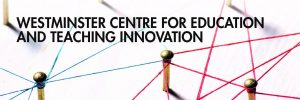
University of Westminster Learning and Teaching Excellence Awards
Please note the application process for the next University of Westminster Learning and Teaching Excellence Awards will be published in early 2024. This will be promoted via Westminster Weekly and the CETI Newsletter.
Guidance for staff nominations for the University of Westminster Learning and Teaching Excellence Awards
We are delighted to announce that nominations for the University of Westminster Learning and Teaching Excellence Awards 2023 are now open. These awards recognise and celebrate a diversity of exemplary individual and team-based practices which have demonstrated a significant and sustained impact on student learning and the student experience.
Any staff member at the university can nominate a colleague in one or several of the 10 categories listed below. Colleagues cannot nominate themselves for an award.
Eligibility
All staff engaged in teaching and supporting learning practices at undergraduate and postgraduate level at the University are eligible for nominations. This includes those in academic-related roles, Professional Services staff, part-time visiting lecturers and Graduate Digital Learning Assistants. Colleagues must be nominated by a member of staff at the University, not a student. Nominations for individual awards should identify the contributions that an individual had made and the impact of these contributions on student learning practices and experiences. Nominations for team awards should identify the success, impact and value a team-based initiative has had on enhancing learning and teaching at the institution.
NB After a period of three years from the start date of the actual award, previous award winners of the WLTEAs or Westminster Teaching Fellowships may be nominated again, but new claims should be based on work undertaken in the academic year 2022/23 which is different from the previous application.
Award winners
Up to 8 individual awards of £1,000 and 3 team awards of £3,000 will be made. The awards are intended to be used for professional development and to further impact and extend the reach of colleagues’ practices.
The winners for each award will be announced at the Westminster Learning and Teaching Symposium in September 2024.
Benefits and expectations of an award
-
Awards are intended to be used for professional development, and to further the impact and reach of colleagues’ work. Funds can be spent on anything that will enhance these aspects including learning and teaching resources; study visits, conference attendance and networking opportunities; and support for research. CETI will request a short report to describe how the award money has been used.
-
Westminster Learning and Teaching Excellence award holders will be profiled on the Centre for Education & Teaching Innovation’s web pages with a brief summary of the work, a short biography and a photograph (at your discretion). You may also be asked to participate in providing a short “talking heads” video for the CETI website
-
Award holders are expected to contribute to Westminster Learning Communities and to the annual Learning and Teaching Symposium, sharing practice and working with colleagues at networking events in Schools and more widely across the University.
-
Additionally, each year the University supports up to three people to make an application for the National Teaching Fellow (NTF) Scheme and to make a team application for the Collaborative Teaching Excellence (CATE) Scheme. Applicants put forward for these schemes must be HEA Fellows (any category). Winners of the Westminster Learning and Teaching Excellence Awards may wish to consider applying for a National Teaching Fellowship or a CATE.
Award categories and criteria
There are 10 award categories. The general criteria against which each award are assessed are described below:
| Success and Value | The benefits of the nominee’s/nominees’ practice for the development and support of students’ learning are clearly demonstrated and evidenced. |
| Impact | There is clear evidence of how the nominee’s/nominees’ practice has shown a significant and sustained impact on the student learning experience and influenced colleagues’ work within the university. Evidence of impact should extend further than course level. |
| Commitment | The nominee’s/nominees’ practice has demonstrated a commitment to innovative and inclusive approaches to teaching and learning and supporting the student experience. |
Guidance relating to individual criteria for each award is provided below:
Award Category quick links
Leadership in Learning and Teaching
Evidence of significant and transformational leadership in learning and teaching within the University needs to be demonstrated. This may be at course-level or College/School level or in a cross-institutional role. Nominees may have had a significant influence on colleagues’ practices or on institutional policy, leading to educational change. There is no assumption that nominees will be in a senior or managerial position.
Employability
Evidence of outstanding support for students to develop their employability skills in line with the University’s Employability Strategy needs to be demonstrated. Examples may include providing opportunities for students to experience the professional world through their modules or courses; skills development; authentic assessment design; and collaborations with businesses and organisations.
Transformative Learning and Teaching
Evidence of student-centred inspirational and transformative pedagogical practices which have had a significant and sustained impact on students’ motivations, confidence and learning experiences needs to be demonstrated. The focus should be on how the creation of personal and compassionate learning spaces has empowered students to take control of their growth and development resulting in both a transformation of self and in their learning. Examples could include valuing and recognising prior experiences and knowledge in programme design and practice; promoting peer learning and collaboration; and developing critical thinking skills, independent thought and learning autonomy.
Authentic Learning
Evidence of situated pedagogical approaches to the curriculum that promote engagement in meaningful, creative and immersive learning practices aligned to real-world experiences needs to be evidenced. The focus should be on contextualised, collaborative learning practices which provide students with opportunities to explore, discuss and offer solutions to issues of national and global significance, aimed at making a difference to others and the world around them. Examples could include project-based learning; engaging in enterprise and consultancy to industry approaches; and simulated-based learning.
Curriculum Design
Evidence of successful innovation in curriculum design needs to be demonstrated. This may relate to a module or a course but shows how the adoption of a new design has led to an enhancement of the student experience. Examples might include the mode of delivery, the pedagogical approach adopted (e.g. problem-based learning or research and inquiry), or initiatives to improve coherence across the course. It could also relate to successful efforts to work in partnership with students to improve the curriculum.
Digital Innovation
Evidence of impact to enhance students’ experience through the innovative use of technology needs to be demonstrated. This may include classroom-based technologies, online learning technologies or any combination, provided the use is driven by a pedagogical need. The expectation in this category is that the technology usage goes beyond what might be termed base-level technology adoption.
Approaches to Diversity and Inclusion
Evidence of how learning, teaching and assessment practices have promoted the values of diversity and inclusion needs to be addressed. The expectation in this category is that individuals have excelled in their commitment towards the development of inclusive pedagogical practices and curricula to address attainment gaps and to enable all students to have a positive learning experience. Examples could include the creation of accessible and inclusive teaching and learning environment; work on decolonising the curriculum; and co-creation with students in programme design.
Academic Support
Evidence of the significant contribution and impact that academic support has had on the student learning experience needs to be demonstrated. This could include personal tutoring; sustained support for student mental health and wellbeing; and facilitating student transitions throughout the learners’ undergraduate or postgraduate studies.
Embedding Sustainability
Evidence of how sustainability has been successfully incorporated into programme design needs to be evidenced. This could relate to how programmes have been redesigned to develop students’ sustainability literacy. The expectation in this category is that the adoption of creative pedagogical practices have equipped students with the knowledge, skills, values and critical understanding to engage with complex sustainability issues on a local, national and global scale.
(For team awards) Collaborative teaching
Evidence that collaborating as a team of at least three members has generated new solutions that demonstrably impact upon colleagues and/or students’ needs to be demonstrated. Examples of collaborative work might include reviewing an existing module in an innovative way; designing new ways of working that support student learning; or developing innovative extra/co-curricular opportunities that enhance student learning and development. Any of the aforementioned nine themes could be embedded into the application. Teams could include staff and student partnerships, interdisciplinary teams or collective doctoral supervision.
The nominations and submission process
Nominations for the awards are now open and will close on 26th May 2023 with the winners announced in September 2023. Nominations should be made via the form via this link. In the nominating statement (between 500 and 1500 words), the following points should be addressed in relation to the criteria of the individual award category:
-
The specific contributions the nominee has made to the enhancement of teaching and learning and/or student experience at the University of Westminster, documenting the success and value of the practice.
-
The specific impact the nominee’s practice has made to the University of Westminster beyond course level. Examples of evidence could include student voice data; quantitative data indicating the scale, depth and reach of the practice; and work with partnership organisations and communities.
-
How the practice has demonstrated a commitment to innovative and inclusive approaches to teaching and learning and supporting the student experience.
-
For team applications, in addition to addressing the three criteria above, an explanation of how the individuals have successfully worked together as a team should be provided, outlining the specific role which they have undertaken and their contribution to the practice.
For these awards, the nominator must be a member of staff and not a student.
The panel
Panel members comprise the following:
-
The Head of CETI (Chair)
-
Previous award winners
-
Members of CETI
-
Colleagues from different Schools and Professional Services to ensure a diversity of representation and perspective.
Up to 8 individual awards and 3 team awards will be made subject to the quality of nominations. There is no expectation that an award will be made under each of the nine categories.
Timetable
The timetable for the awards is outlined below:
| Deadline for receipt of applications: | May 2024, TBC |
| Panel meetings: | June 2024, TBC |
| Announcement of winners: | September 2024, TBC |
| Learning and Teaching Symposium: | September 2024, TBC |
If you have any questions about the awards or about the nomination process we can be contacted at CETI@westminster.ac.uk.
| 2018 Awards |
Cross-Disciplinary Module Team (Adrian York, Caroline Baruah & Nuala OSullivan) – team award for facilitating cross-disciplinarity amongst the student body and lecturers from disparate professional practices.

Adrian York is a Senior Lecturer in Commercial Music presently developing protocols for interactive jazz performance as part of his PhD research. Still active as a jazz musician in past lives he was a pop star, media composer and ran a music agency business.
— Adrian York

Caroline Baruah, originally from New Zealand I settled in London after graduating from Goldsmiths Art School (Textiles). I have worked as a self-employed artist both before and, during teaching in Higher Education. At UoW I currently teach Illustration & Visual Communication at undergraduate levels.
— Caroline Baruah

My early career in classical music and theatre developed in occupational psychology and change management. My work in cultural change, and coaching at board level, has informed my approach to teaching. I am Director of Employability at the School of Management and Marketing at the Westminster Business School. I teach HR and Organisational Behaviour at levels 5 & 6 and train MBA candidates in negotiation, communication in change and strategic influencing. My contribution to Pop Goes the Now! centres on the evolution of business and the commodification of art.
— Nuala OSullivan BSc MSc Dip.HE SFHEA Ac.MCIPD MBPS.
Democratic Education Network (DEN; Dr Farhang Morady and Professor Dibyesh Anand) – team award
Dr Farhang Morady is Principal Lecturer in International Relations and Development Studies in the Department of Politics and International Relations. Dr Morady is the founder of the International Community Project and later Democratic Education Network in the Department of Politics and International Relations. Farhang is the director and academic coordinator of DEN. He has 25 years of experience working in an inner-city college and universities in the UK including London School Economics and the University of Westminster. He has developed a link between different communities in London namely Somalia, Bangladeshi, Iranian, Turkish and Kurdish as well as international universities in Turkey, Peru, Vietnam, and Georgia. He has won numerous awards for his contribution to further and higher education. The students have nominated Farhang as an ‘Outstanding Teacher’ in 2013, 2014, 2016, 2017 and 2018 in the faculty of Social Science and Humanities. In 2016, he won an award for ‘Excellence in Student Experience’ in the university-wide Staff Achievement.
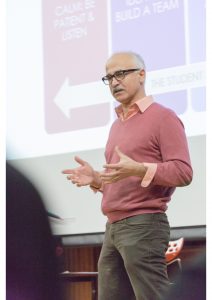
Professor Dibyesh Anand is the Head of the School of Social Sciences at the University of Westminster in London. Until July 2018, he led the Department of Politics and International Relations. He is the author of monographs “Geopolitical Exotica: Tibet in Western Imagination” and “Hindu Nationalism in India and the Politics of Fear” and has spoken about and published on varied topics including Tibet, China-India border dispute, Hindu nationalism and Islamophobia in India, and the colonial occupation in Kashmir. He is also the Chairperson for Westminster BME Staff Network. He identifies as queer in personal and political terms. He is an avid facebooker and available at www.facebook.com/dibyesh.
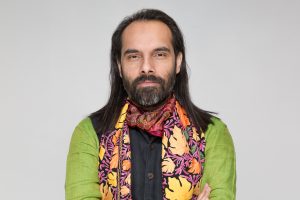
The Learn to Code Team – Anne-Gaelle Colom & Wendy Purdy; Student members of the Learn to Code Community: Evisa Terziu, Roy Belcher, Denisa Bercuci, Andrei Danca, & Sinan Korcelik, – team award
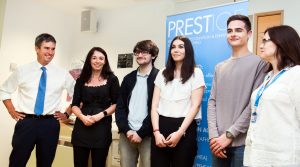
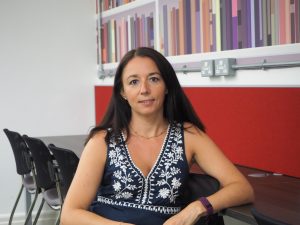
Anne-Gaelle Colom is a Teaching Fellow and Senior Lecturer at the University of Westminster. She is an Open Web enthusiast, passionate about Teaching and Learning and the use of technology in higher education, as well as front-end and mobile web development. Anne-Gaelle has been developing for the web since 1995 and for mobile devices since 1996. Very active in Open Source since 2010, she became a member of the jQuery Mobile Team and the Content Lead for the jQuery Foundation in 2011, and was a member of the jQuery Board of Directors from April 2013 to October 2016. Anne-Gaelle won the Net Award for Innovation of the Year with the jQuery Mobile Team in 2011, and won the Bloomberg International Open Technology WISE (Women in Science, Technology and Engineering) Award in 2016. She is leading the ‘Learn to Code’ Project and Learning Community, and the creator of the codeVisualiser.

Wendy Purdy is a Senior Lecturer in the School of Computer Science and Engineering and Senior Fellow of the Higher Education Academy. Recipient of the ‘Westminster Teaching Excellence Team Award 2018’ for contributions to the ‘Learn to Code’ digital learning resource. The project combines my experience of teaching multiple computer programming languages with my research interest in technology-enhanced learning.
The team award funding will be invested in resources to facilitate the participation of students as co-creators in the next stage of this on-going project.
Hilde Stephansen – individual award
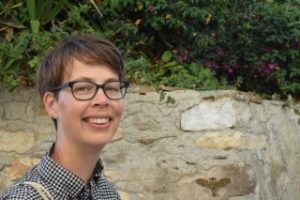
Hilde Stephansen is Lecturer in Sociology and Course Leader for the BA Sociology and Criminology, in the School of Social Sciences. She teaches across a range of modules in social theory and research methods, and her research-led approach to teaching and learning is inspired by principles of critical pedagogy. Hilde is an active researcher with an internationally recognised profile in the fields of social movement studies, media activism and citizen media, and has published a number of journal articles in these areas. She is currently writing a book called Global Media Activism and co-editing a book called Citizen Media and Practice, both to be published by Routledge in 2019. Hilde will be spending her award on a teaching and research exchange visit to the University of Bergen, Norway, in Spring 2019.
Markos Mentzelopoulos – individual award
Markos Mentzelopoulos is a senior academic for the computer science department in the University of Westminster and he is also the Course Leader for the BSc (Hons) Computer Games Development course, delivering modules on game programming, and Artificial Intelligence. Markos has a long experience in developing pattern recognition algorithms for object tracking and data classification and his work has already been published in IEEE, Springer and ACM conferences and Journals.
Mr M Mentzelopoulos is an active research member for the Computational Vision and Imaging Technology (CVIT) research cluster at university of the Westminster.
Markos has been working over developing algorithms for object classification using self-learning approaches [1-9] since 2002. Research has been focused not only over the development phases but also on as well as system evaluation. He has relative industrial experience (G.S.K. 2005-6), during which he applied classifier models for self-organizing collection of data for medical consumer analysis. Latest research projects in immersive technologies (VR, AR) and AI have led in publications and European projects – Macunx VR , several Legal Utopia
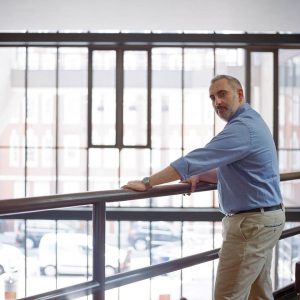
Francis Ray White – individual award
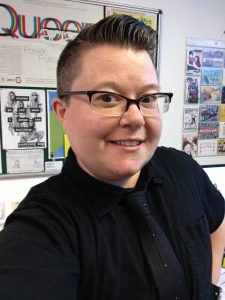
Francis is a senior lecturer in sociology and has been at Westminster since 2007. During this time they have been dedicated to teaching in the areas of gender and feminist theory, sexuality and the body. Francis currently leads several modules in these fields within sociology, as well as the interdisciplinary Westminster Elective module in LGBTQ Studies.
Francis’ teaching not only concerns the importance of understanding gender and its intersections with race, class and sexuality as a key theme in contemporary sociology, but aims to equip students with analytical tools to make sense of (and potentially transform) their personal, political and professional lives. Francis is also an active member of the university’s LGBTQ staff network and is currently engaged in various research projects in the area of trans and non-binary embodiment.
Francis will be putting their WLTEA award money towards funding a symposium as part of a pedagogical research project on non-binary genders in Higher Education. The project is being undertaken with Jennifer Fraser (Westminster) and Raf Benato (City University) and aims to gather experiences of non-binary staff and students in HE and imagine what academia might be like beyond binary gender.
| 2017 Awards |
Lara Rettondini – individual award for innovative use of live projects (Faculty of Architecture and the Built Environment)
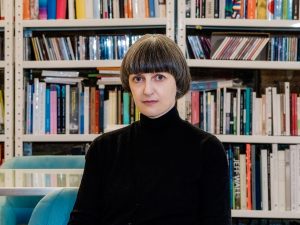
Lara is a Senior Lecturer in the Faculty of Architecture and the Built Environment and works in the Department of Architecture. The application she put forward for the Award focused on a number of pedagogical developments and teaching quality enhancements that she has introduced in the BA Interior Architecture and in the MA Interior Design and her commitment to developing outreach activities to enrich the students’ experience, such as live projects. She also showed significant engagement in supporting colleagues develop as community of practice around learning and teaching.
The application reviewers were impressed by the ‘transformative impact for both students and colleagues’ in the work described. One example is the project that Lara organised building on her relationship with the Victoria and Albert Museum, which started as a workshop for the cross-departmental Playweek and further developed into an extra-curricular project, working to a brief from the curator of 20th Century and Contemporary Furniture and Product Design, to make a proposal for the 20th Century Gallery. Through getting involved in this project a very diverse range of MA students could work collaboratively to achieve a common objective in response to specific requirements from an external organization and within a defined timeframe. In this project, students developed teamwork aptitude at the same time they were learning about their subject. The feedback and comments from the V&A curators gave students a sense of accomplishment, pride and confidence.
One of the participant students commented: ‘This was an amazing experience. I am certain that all the members of the group are as thankful as I am for this project initiative that represented enrichment to our academic experience at the University’.
IT Training Team (Kevin Lawley, Jemma Perrin, Charles Glancey) -Team award for creative approaches to developing talent though IT training
The work put forward for the award showed the impressive impact of the team, from scheduled sessions organised through faculties and departments to support software knowledge and explaining its potential applications, through to enabling students to gain internationally recognised IT qualifications that significantly enhance their employability. Their achievement is best described by Andrew Griggs, Country Manager – UK | Prodigy Learning.
The training team at the University of Westminster are one the most active, progressive and supportive Testing Centres for vendor productivity and employability skills that Prodigy Learning works with. The team are one of our most successful testing centres within our Higher Education clients. Their success is seen via a high pass rate for both Adobe ACA and Microsoft MOS certification which has resulted in students from the University regularly finding places in the finals of our student competitions. The competitions for MOS and ACA see the top 20 students from across the UK (by exam score) invited to finals days at both Microsoft and Adobe’s respective Head Offices where they compete to become the UK Student champions. The University has accounted for nearly 50% of the finalists in the last two Adobe competitions and had the UK Adobe Champion (Will Clarke) in 2015. Will went on to represent the UK and the University at the Global Championships in Dallas, Texas.
The team is in high demand to speak at Prodigy-sponsored events and other universities who are looking to begin similar training programmes, including the 2017 BETT show at Excel, London.
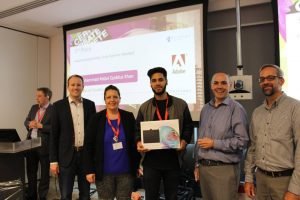
Mohammad Khan, a BSc Multimedia Computing student won third place in the Adobe Certified Associate (ACA) UK Championships in June 2016
Dr Ricardo Blaug, Dr Thomas Moore, and Dr Farhang Morady – Team award for their globally engaged curriculum in Politics and International Relations (Faculty of Social Sciences and Humanities)
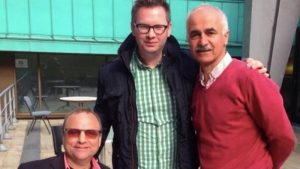
Left to right: Ricardo Blaug, Thomas Moore, and Farhang Morady
The work put forward by the team showed outstanding commitment to finding ways to ensure that the internationalisation of the curriculum is a lived reality for all students in Politics, International Relations and Development. Their approach is to imaginatively triangulate internationalisation of the curriculum, employability, and students as co-creators of knowledge, to enable their diverse community of students to thrive in a changing world through:
• Fostering learner autonomy through independent enquiry, developing student research projects and students as co-creators in an international environment, such as through the International Community Project and the Democratic Education Network.
• Inspiring Westminster students to think globally about their changing worlds. This is achieved through dialogue and shared experiences across borders with students from partner universities in Turkey, Brazil, Peru, Uzbekistan, and Vietnam. It is also achieved through innovative approaches to outward mobility, informed by principles of equality and access; – Facilitating global mobility for 200+ plus Westminster students,
• Embedding skills for global employability and professional resilience, using diversity as resource and a tool for problem-solving, and authentic learning as a foundation for professional capacity building in students.
The application reviewers commended the team, for “… their extensive engagement, globally, with international partners, and the sustained beneficial impact on students, the course, the university and in other institutions. It is clear that the learning experiences for the students will impact both professionally and personally beyond their student lives.”
The Sociology course team (SSH)- Team award for innovative curriculum
The team: Dr Dorrie Chetty (Course Leader BA Sociology & Criminology), Dr Adam Eldridge, Dr Umit Cetin, Dr Emily Falconer, Dr Celia Jenkins, Dr David Khabaz, Dr Ben Pitcher, Dr Naomi Rudoe, Dr Hilde Stephansen, Dr Francis Ray White (Course Leader Sociology)
Find out more about the Sociology Research Group.
The team’s approach to learning and teaching is based on their commitment to the students and delivered through critical pedagogy, which entails an active engagement in real world issues, creative use of external speakers and social media, and dissemination of the most innovative final-year dissertation work in a publicly available anthology.
The course is research-led, drawing in the team’s research expertise in areas including race/ethnicity, religion, migration, LGBTQ studies, and feminist pedagogies, while also proactively working through strategies to support learning across their widely diverse student group. Study skills and information literacy are fully integrated within core modules, including the use of assessment workshops to help students to develop their writing and critique. The course has a very active facebook page. The page has been in operation since 2012 and has nearly 300 followers.
The result is what one external examiner described as an imaginative, academically rigorous, demanding and exciting undergraduate learning environment (Neal, 2014). The success of their strategy is evidenced by NSS satisfaction scores consistently above 90% (100% in 2015) and a dramatic improvement of course ranking in the Guardian University League Tables from 81st in 2014 to 26th in 2016, placing the course second only to Goldsmiths among London universities.
The application reviewers found theirs to be “an exemplary application with compelling and impactful evidence to address all three criteria. The team should be congratulated for their commitment to teaching and learning and their students, and for the work they do to disseminate good practice within the university and beyond.”
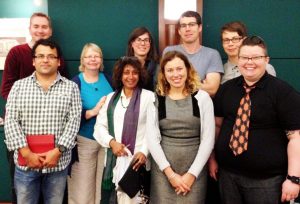
From left to right: Adam Eldridge, Umit Cetin, Celia Jenkins, Dorrie Chetty, Naomi Rudoe, Emily Falconer, Ben Pitcher, Hilde Stephansen, Francis Ray White
Dr Alexander Bolotov, Dr Anastassia Angelopoulou, Dr Phil Trwoga and Mark Baldwin (Department of Computer Science) – Team award for innovative approaches to Mathematics provision
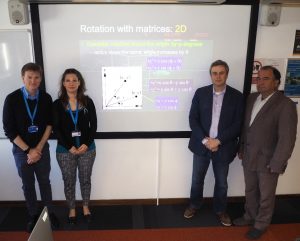
Phil Trwoga, Anastassia Angelopoulou, Mark Baldwin, Alexander Bolotov
This award comes as recognition of the team’s long-term efforts to transform and enhance the mathematics provision, as evidenced by the pass-rate on one core module rising from 53% to 87% over a period of six years from 2010-2016. Over the years the team has been involved into the design and implementation of 13 mathematics related modules at both UG and PG levels by bringing and reflecting constantly on their scholarship and research experience.
Mathematics is related to the wider context of computer science and software engineering. The team’s approach was to identify the ways to present core mathematical concepts that underpin the discipline in a ‘problem-based learning’ approach to enable students to access the abstract logic of mathematical thought-process. Various techniques were used here – group discussions and analysis of problem scenarios supported by use of video materials and mobile technologies in teaching mathematics. The team developed this process not only as a means to help students reformulate concepts that might have been only poorly formed in their earlier maths education, but also to build the practice of strengthening students ability of abstractions and abstract reasoning – which is the corner-stone of computer science and many other theoretical sciences. The approach also enables students to learn collaboratively with brighter students modelling thought- process for weaker ones and reduces dependence on tutors for one-to-one explanation and feedback.
The application reviewers were impressed by the transformative impact of team’s work for both students and colleagues. In particular, that the “application clearly demonstrates excellent practice, based on sound pedagogy, innovation in terms of synoptic delivery and the team’s focus on student-centred learning. The result of their work is outstanding, not only in terms of the marked improvement of the pass rate, but also in terms of students’ self-efficacy, as evidenced in the feedback…. The team provides an outstanding example of its impact on promoting and transforming the student learning experience with its discussion of the transformation of a core maths module.”